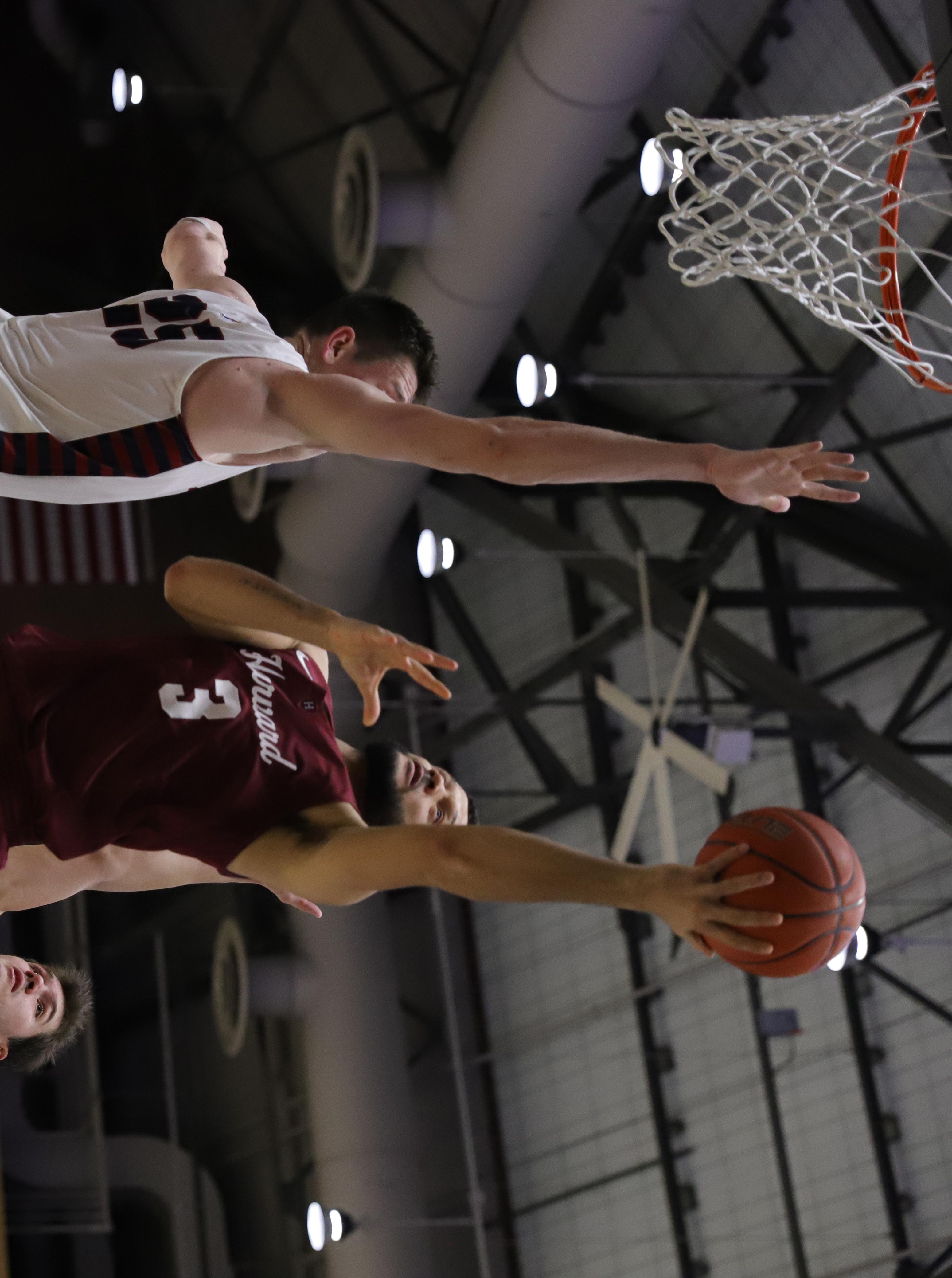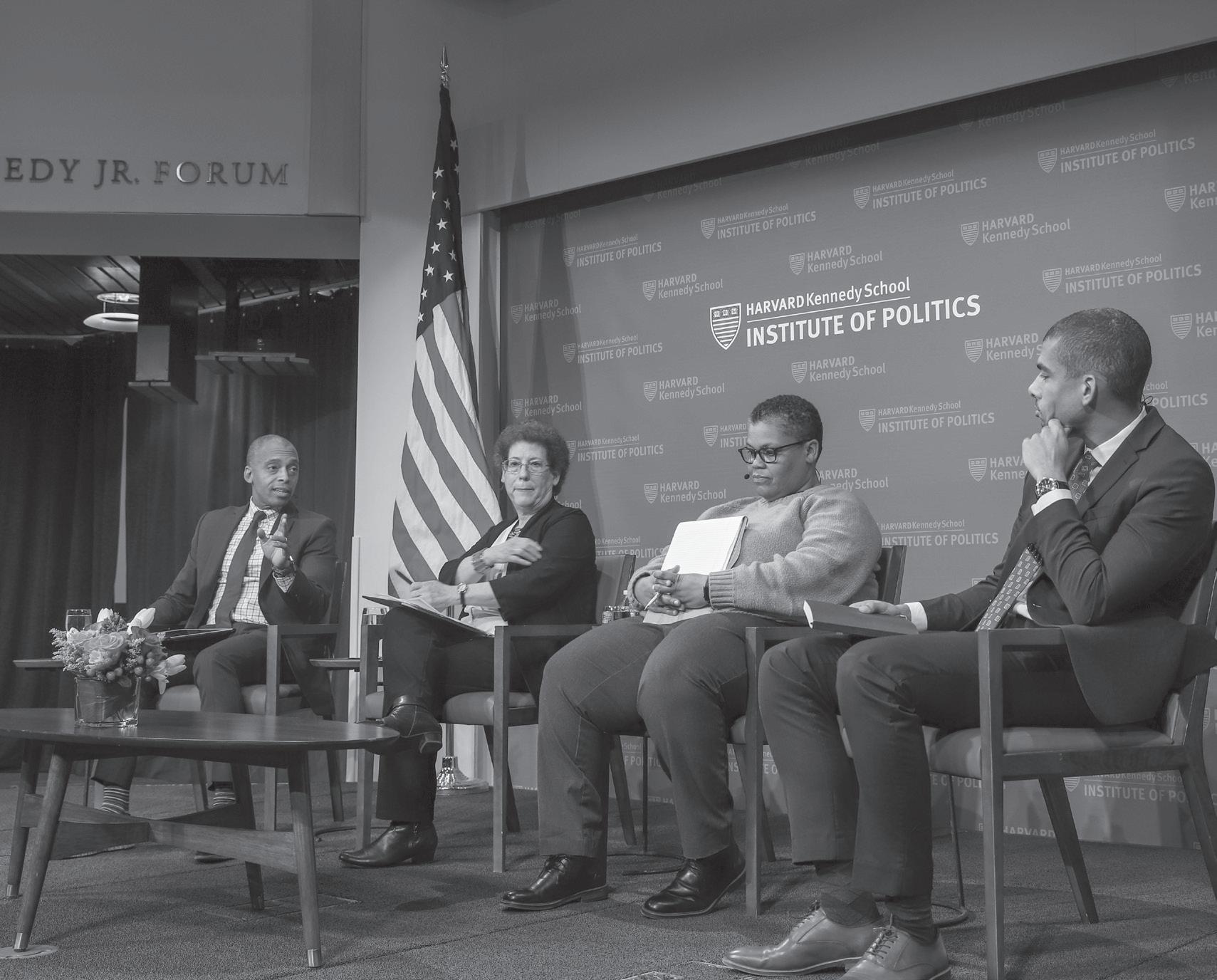The Harvard Crimson THE UNIVERSITY DAILY, EST. 1873 | VOLUME CXLVII, NO. 24 | CAMBRIDGE, MASSACHUSETTS | WEDNESDAY, FEBRUARY 26, 2020
EDITORIAL PAGE 4
NEWS PAGE 3
SPORTS PAGE 6
The prison divestment movement poses a moral comparison problem
Experts discuss racism and housing policy at the Institute of Politics
Notebook: Harvard closes in on Ivy Tournament berth
Gates Scalise Calls Athlete Attrition Rates ‘Healthy’ Among Highest Donors By EMA R. SCHUMER CRIMSON STAFF WRITER
By ELLEN M. BURSTEIN and CAMILLE G. CALDERA CRIMSON STAFF WRITERS
Tech billionaires, foreign entities, and at least one Democratic presidential candidate number among Harvard’s top donors, according to the Harvard University Report of Giving 2018-2019. Three donations totalling $431 million topped the donor honor roll. The largest came from entrepreneur Leonard Blavatnik — a graduate of Harvard Business School — who committed $200 million to Harvard Medical School, the largest gift in its history. The funds are aimed at “solving some of humanity’s most acute biomedical challenges,” per a Medical School webpage dedicated to the gift. In recognition of the gift, the Medical School named its umbrella research institute and a biotech startup lab for Blavatnik. Hansjörg Wyss — another Business School alumnus — donated $131 million to the eponymous Wyss Institute for Biologically Inspired Engineering. The gift marked Wyss’s third major donation to the University since 2009. David E. Goel ’93 and Stacey L. Goel donated $100 million to fund a research and arts performance center that will be part of the University’s new campus in Allston. An anonymous gift capped off the top tier of donations, which includes gifts totaling more than $100 million. Asked about the report, Harvard spokesperson Christopher M. Hennessy declined to comment on specific donations. “Harvard depends on the generosity of alumni and donors who support our mission at all levels, enabling the university to have a lasting impact in areas of teaching, learning, research and innovation,” Hennessy wrote in an emailed statement. Other big-ticket donations include gifts from both boldface names in the tech world and prominent philanthropic groups.The Bill and Melinda
SEE DONORS PAGE 5
arvard Athletics DirecH tor Robert L. Scalise said in a Tuesday interview that it is “healthy” that roughly one in four Harvard student-athletes drops their sport during their time at Harvard. Last week, an analysis by The Crimson found 27 percent of the current senior class who has played on a varsity sports team at Harvard quit their sport by their senior year. Nine former student-athletes in the Class of 2020 cited academic and extracurricular interests, injuries, and mental health concerns as the main reasons behind their decisions to step away from athletics. Scalise said on Tuesday that his department is not concerned by the estimated one-in-four attrition rate. Scalise noted that sports are a component of a student-athletes’ educational experience and compared athletes’ decision to stop playing their sport to students’ decision to change their concentration. “Athletes and all students come here to develop,” Scalise said. “And it’s like what people
do when they write what major they’ll major in or the concentration they’re interested in. You come in here with a certain set of ideas of what you want to do, and then over time you grow and develop and sometimes you grow deeper in that area.” “Sometimes you grow away from that area and you experience other things,” he added. Scalise said he thinks an athlete’s decision to step away from their sport shows they have developed newfound interests. “For me it’s actually a pretty healthy number to have 25 percent because it means that there are some students who have chosen to do other things, they got excited about something else that they did, or they said the time I’m putting into this activity could — it would be better for me to spend it elsewhere,” he said. Though Scalise said members of his department interview and survey graduating athletes each year to gather feedback on their time at Harvard, he maintained that Athletics is not interested in pursuing ways to increase athlete retention.
SEE SCALISE PAGE 3
Robert L. Scalise will serve as Harvard’s Director of Athletics through the 2019-2020 academic year before he retires in June. JONATHAN G. YUAN—CRIMSON PHOTOGRAPHER
Early Voters Go to Polls for Presidential Primaries By JASPER G. GOODMAN CRIMSON STAFF WRITER
A signpost reminding Cambridge residents to vote stands in Quincy House’s courtyard on a sunny Tuesday afternoon. SARA KOMATSU—CRIMSON PHOTOGRAPHER
HUHS Launches Student Health Survey By FIONA K. BRENNAN CRIMSON STAFF WRITER
Harvard University Health Services launched a health survey Tuesday to gather data on what HUHS Director Giang T. Nguyen called the “current held experiences” of undergraduate students. The survey, which Nguyen and Dean of the College Rakesh Khurana sent in an email Tuesday, asks students about their physical, mental, and sexual health, as well as alcohol and drug use. The questionnaire comes three months after Nguyen replaced Paul J. Barreira as HUHS Director. Barreira held the position for seven years and announced in January 2019 that he was stepping down. The survey asks undergraduates detailed questions about their sleep and exercise habits, stress management, substance use, eating patterns, body image, sexual activity and safety, unwanted sexual conduct, and self-harm.
ess than a week before Super L Tuesday, Massachusetts residents are already casting their ballots in the 2020 presidential primaries. For the first time ever during a presidential primary, Massachusetts is holding a five-day early voting period where residents can cast ballots at any open polling locations in their municipalities. “Early voting opens up a lot more convenience in voting for people who don’t qualify for absentee ballots,” Debra O’Malley, a spokesperson for Massachusetts Secretary of State William F. Galvin, said. Unlike on Election Day, early voters are not assigned to specific polling places. In Cambridge, residents can cast their ballots at any of six polling locations open for early voting. On Monday, the first day of early voting, 1,716 voters cast ballots, according to Cambridge Election Commission assistant director Lesley Waxman.
INSIDE THIS ISSUE
Harvard Today 2
News 3
Editorial 4
Sports 6
TODAY’S FORECAST
SEE SURVEY PAGE 5
SEE VOTING PAGE 3
Khurana Hopes to Broaden Ideas of Service By JULIET E. ISSELBACHER and AMANDA Y. SU
Students completing the health survey can choose to either receive an El Jefe’s gift card or donate to Australia wildfire relief. JONATHAN G. YUAN—CRIMSON PHOTOGRAPHER
The Massachusetts state legislature passed a bill in 2014 that approved early voting for general elections. The legislature passed a provision approving early voting for the 2020 presidential primaries at Galvin’s request. More than 20 percent of voters cast ballots early in 2018. In Cambridge, more than a quarter of voters went to the polls early for the midterm elections. “It’s never been shown that early voting necessarily increases turnout, but it does make it much easier for the people who want to vote to vote,” O’Malley said. Rebecca Simonson, a firsttime early voter who said she cast her ballot for United States Senator Elizabeth Warren (D-Mass.), said she “appreciated the convenience” of the process. “It was a lot easier than the normal process of going to my precinct location and voting,” Simonson said. Simonson, who voted
CRIMSON STAFF WRITERS
Dean of the College Rakesh Khurana said in an interview last Tuesday that he hopes to expand the way Harvard College and its students define public service. He said he believes people often have a “narrow” perception of what constitutes public service, citing stereotypes that students assign to different jobs and industries. “I want to have a kind of expansive definition of that, because I think the old definitions tended to be too narrow and not necessarily reflect the array,” he said. “Just based on my experiences, both as a faculty member at the business school and as well as faculty dean in Cabot, this is more of a continuum than these kinds of discrete categories that people often place.” Khurana said, for example, that students who enter careers in consulting — a profession he said lends itself to “caricatures”
CLOUDY High: 46 Low: 42
— often do service work via advising governments, nonprofit organizations, and companies in sectors such as health care and education. “But the question of how you approach that job and the orientation you bring to that also matters,” he said. Keeping this wider definition in mind, Khurana said he hopes that the Phillips Brooks House and the Office of Career Services can collaborate to provide students with a “wide array” of public service opportunities. He also spoke about the College’s role in promoting public service more broadly. “We expect all of our students to integrate this notion of service and the responsibility that comes with being an engaged member of our community in whatever aspects or careers they end up choosing,” he said. He cited both longstanding Harvard institutions like
SEE KHURANA PAGE 3
VISIT THECRIMSON.COM. FOLLOW @THECRIMSON ON TWITTER.
rinsed




